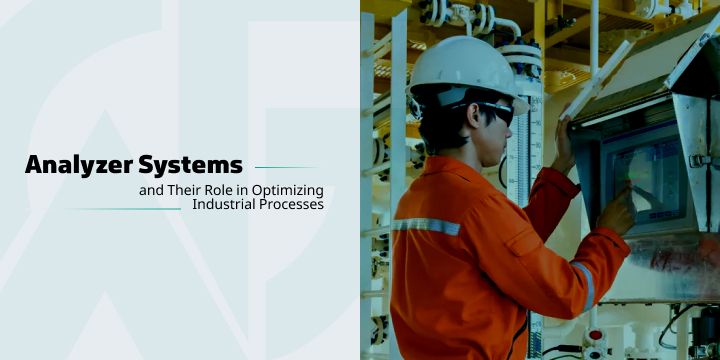Analyzer systems are vital tools in various industries for monitoring, controlling, and optimizing industrial processes. These systems continuously analyze chemical, physical, and biological data, providing precise information about the status of processes to facilitate more accurate and efficient decision-making. They play a particularly crucial role in complex and sensitive industries by maintaining quality, reducing costs, and increasing productivity.
What Are Analyzer Systems?
Analyzer systems are devices designed to measure and analyze the chemical, physical, or biological properties of a substance in an industrial process. Typically, these systems consist of sensors, transducers, signal processing modules, and data analysis software. They play a critical role in maintaining product quality, reducing costs, and enhancing productivity in industrial environments. By using these systems, problems in processes can be identified and resolved in real time, significantly improving overall process performance.
Main Components of Analyzer Systems
Analyzer systems consist of various components, each contributing to their precise functionality:
Sensor:
Measures the chemical, physical, or biological properties of the material. Sensors directly measure parameters like temperature, pressure, material concentration, pH, and other characteristics.
Data Processing Module:
Processes and analyzes the data collected by the sensors. These modules can analyze data in real time.
Display:
Presents analytical data in a comprehensible and actionable format for operators. Displays may include charts, graphs, and status alerts.
Control System:
Based on the analyzed data, the control system makes decisions to implement changes in the process. This system may automatically or manually adjust process conditions.
Types of Analyzer Systems
Gas Analyzers
These analyzers measure gas compositions in industrial processes. They can identify and quantify gases like carbon dioxide, oxygen, nitrogen, and volatile organic compounds (VOCs).
Applications: Pollution control, combustion monitoring, and chemical process management.
Liquid Analyzers
Liquid analyzers measure parameters such as pH, conductivity, chemical concentration, and dissolved oxygen in liquids.
Applications: Food industries, water treatment, and the production of chemicals and pharmaceuticals.
Solid Analyzers
Designed to analyze the physical and chemical properties of solid materials, these analyzers measure features such as crystalline structure, chemical composition, and physical characteristics.
Applications: Mining, cement, metals, and agriculture industries.
Hybrid Analyzers
These systems can measure the composition of gases, liquids, and solids within a single system. They are ideal for complex applications and environments with varying conditions.
Applications: Complex industries such as petrochemical plants, refineries, and pharmaceutical production.
Role of Analyzer Systems in Optimizing Industrial Processes
Quality Control
Analyzer systems provide accurate and real-time data to maintain product quality at standard levels. They can detect undesirable changes in processes and issue timely alerts for corrective actions.
Increased Productivity
By reducing response times and providing real-time information, analyzers help industrial processes operate more efficiently with minimal material and energy waste. This boosts productivity and reduces operational costs.
Cost Reduction
Continuous monitoring and precise data analysis minimize the need for manual testing and process downtime. This results in significant cost savings and improved economic performance.
Enhanced Safety
Analyzers play a critical role in increasing process and personnel safety by identifying and alerting operators to hazardous conditions. These systems can detect dangerous situations such as gas leaks or temperature increases and trigger timely safety actions.
Environmental Protection
By accurately measuring and controlling pollutants, analyzer systems help reduce the environmental impact of industrial processes. This is particularly important in highly polluting industries such as petrochemicals and oil and gas.
Applications of Analyzer Systems in Various Industries
Oil and Gas Industries
Measuring gas compositions to optimize extraction and refining processes.
Monitoring pollutants and reducing environmental hazards.
Enhancing combustion management and energy production facilities.
Petrochemical Industries
Analyzing chemical compositions to maintain product quality.
Precisely controlling chemical reactions in production units.
Optimizing production processes and reducing waste.
Power Plants
Monitoring flue gases from boilers.
Controlling steam and water quality in power generation systems.
Optimizing fuel consumption and reducing emissions.
Food and Pharmaceutical Industries
Monitoring the quality of raw materials and final products.
Ensuring production conditions meet health and safety standards.
Precisely analyzing chemical substances and active pharmaceutical ingredients.
Water and Wastewater Industries
Monitoring the quality of drinking water and treatment processes.
Measuring pollutants in industrial wastewater.
Optimizing treatment processes and reducing energy consumption.
Conclusion
Analyzer systems are recognized as key tools in optimizing industrial processes. By providing precise and real-time data, these systems improve quality, enhance productivity, reduce costs, and promote safety. Furthermore, they play a critical role in environmental protection by minimizing the adverse effects of industrial processes. The widespread adoption of these systems across industries demonstrates their significant impact on industrial advancement and sustainability. In companies like Erike Gostaran Farayand, these systems can serve as efficient tools for improving performance, optimizing processes, and achieving economic and environmental goals.

